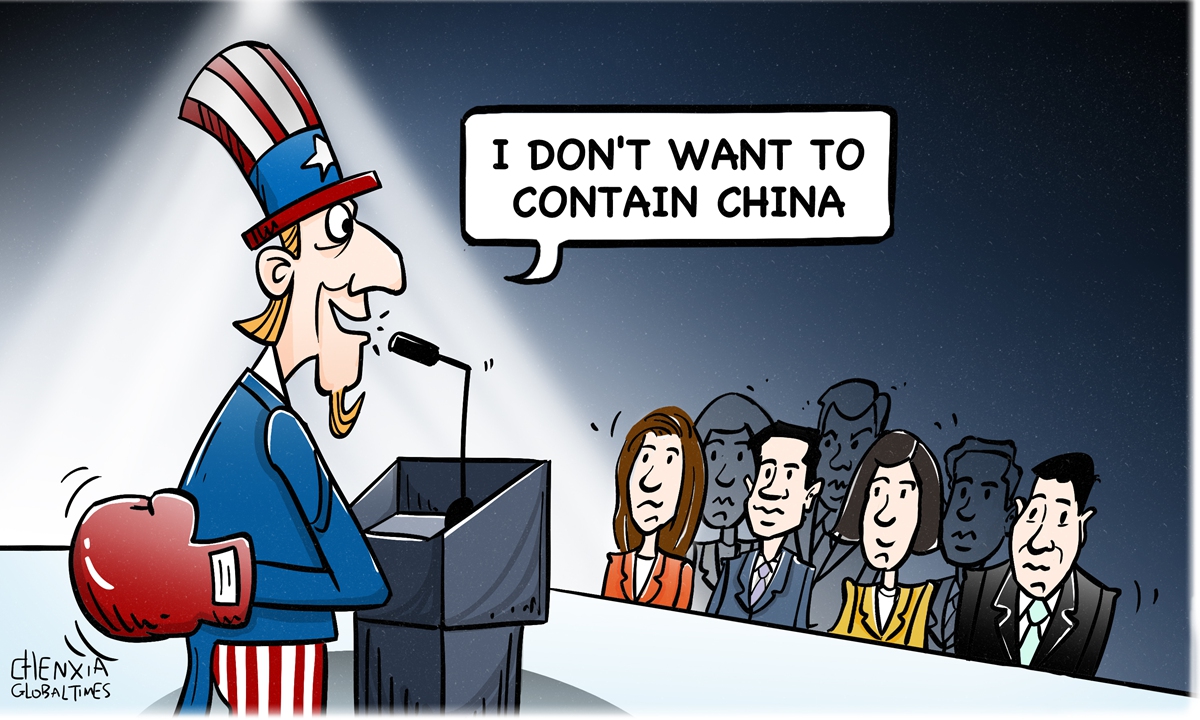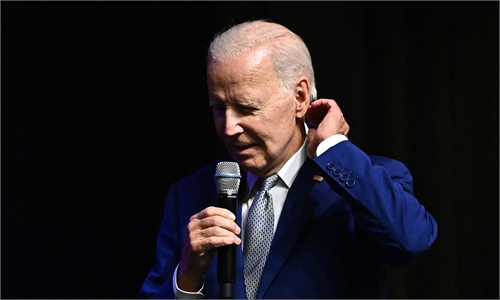
Illustration: Chen Xia/Global Times
US President Joe Biden said at a news conference in Hanoi, Vietnam, on Sunday after upgrading the US-Vietnam relationship, "I don't want to contain China. I just want to make sure that we have a relationship with China that is on the up and up squared away." He added, "I am sincere about getting the relationship right."
Ma Bo, an associate professor at the School of International Studies at Nanjing University, believes that this is Biden's tailored strategy toward China.
The "China threat" theory peddled by the US and its attempt to win over regional countries to contain China are not supported by these countries. ASEAN countries are unwilling to choose sides between China and the US, but they hope that both sides can manage differences and maintain regional peace and stability. Against this backdrop, Biden realized that it would be better for him to emphasize "the US does not want to contain China" when he was there. His target audience was not only China, but also ASEAN countries, so as to establish a positive image of the US. But once he goes to Europe, Japan or South Korea, he will make no reservation to label China as a threat.
"Be it in technology or trade, the US has not eased its containment of China. The US wants to leave an impression on the region that it does not want to contain China, which is hypocritical," Ma told the Global Times.
For Vietnam, being involved in great power competition is not in its interests. Even if the relationship between the US and Vietnam upgrades, Vietnam will continue to adopt a balanced strategy. Vietnam does not trust the US and is worried about the US' interference in its political system. Meanwhile, the US has limited support for Vietnam's security, and Vietnam still needs to purchase weapons from Russia.
Wang Jiangyu, a professor at the City University of Hong Kong School of Law, told the Global Times that in the eyes of the US, Vietnam is an ideological rival, but now the US is courting Vietnam with a realist attitude because it believes that Vietnam could be part of its efforts to set up a global united front against China. Wang said this is the logic behind the upgraded ties between the US and Vietnam.
Since taking office, the Biden administration on the one hand boasts of "guardrails" in China-US relations, but on the other hand hypes up "decoupling" and the so-called de-risking. Now it talks about "not containing China" and "getting the relationship right." It can be seen that the China policy within the Biden administration is messy and divisive.
Wang told the Global Times the current China-US relations make the US feel a sense of uncertainty, and such a sense of uncertainty does not help the US craft and implement its China policy, therefore the US wants a relationship that is "on the up and up, squared away." But partisan consensus and domestic political atmosphere determine that containing China has become unquestionable and irreversible. This is why the US is unlikely to make any compromises in its China strategy.
The US has no plan to let go of its wild ambitions, be it about the trade war, technological blockade, sanctions, the Taiwan question and the various cliques it has formed in China's surrounding areas to check China's rise. It should not expect China to sit still. The strength gap between China and the US is narrowing. China is not what it used to be when the US bombed the Chinese embassy in Belgrade in 1999 or when the Chinese ship Yinhe was detained by the US Navy in international waters in 1993, allegedly containing chemical components headed for Iran, but was eventually cleared after months of inspection.
If the US sincerely wants a right relationship with China, it should learn to respect China's core interests and view China from an equal footing. However, so far, there is no sign of US sincerity except rhetoric.
Diao Daming, a professor at the Renmin University of China in Beijing, considers such rhetoric "deceptive" and a clap on the US' own face, as it actually serves the US' hegemonic agenda and aims to maximize US interests, but at the same time requires China not to respond.
"No mutual respect and 'only the US benefits' are not what a right relationship is supposed to be," Diao said.

